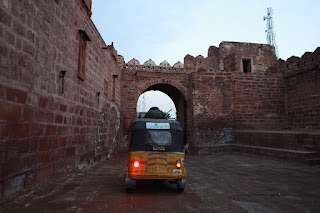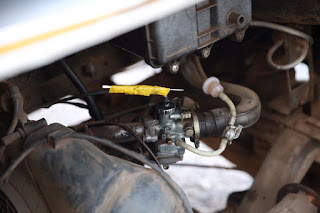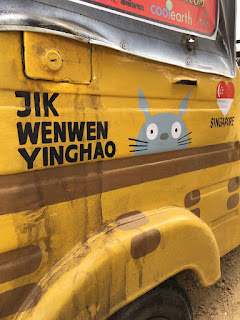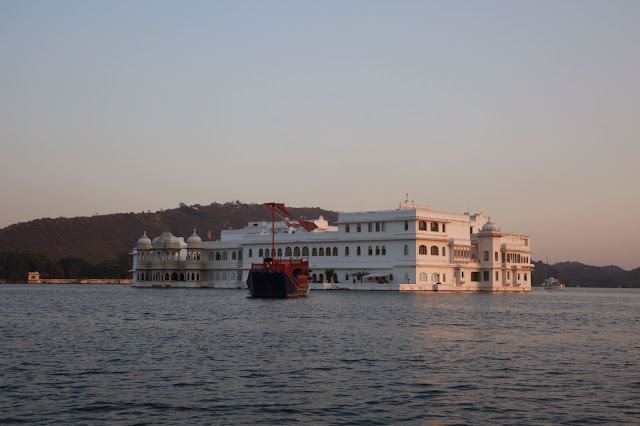Surprise!
Yinghao had a great post
HERE and it was truly befitting of a ending to a great journey. It was also his last personal post (he told me so), and served as closure on our adventure. For a while I thought, "yeah, this ended well". But then I'm more like one of those Hollywood types who try to milk every last drop from a good series with spin-offs and prequels and merchandising.
I like to write silly stories and there was still a bunch in my head so I figured, "ah hell why not." Also, since we're still
open for donations for a while more I figure I'll keep it running a bit more before closing up.
First up, thanks to each and everyone of you for donating, reading, sharing and being a part of our journey! It brought a different sense of depth and dimension to something that simply started out as a quest for adventure.
Anyway, about India.
 |
| That's our route, give and take some amount of city driving, U turns and detours. |
So now that I've had the time to properly sit down and review stuff, I've made a map that shows our actual route, as opposed to our planned route. Which looks very similar on the whole, except
just about all the stops were different. I'd say we didn't do too badly in terms of planning. Haha.
We drove 2714km, give and take maybe a 100km or so to account for city routing, detours in search for McDonald's, some ferries that Google Maps won't let me plot (and hence changes our route), but pretty much everything is there. The additional section from Jaisalmer to Delhi is a recreation of our train ride, all 800+km of it, because My Maps doesn't allow me to use public transport to plot routes.
2714km at an average of ~30km/h puts us at about 90 hours of driving, which is about 6.5 hours a day. That definitely sounds too little to me, so I think our average speed was probably closer to 25km/h, giving us 8 hour drives on average. Sounds about right, including the crazy 12 hour days and the rest day in Udaipur.
This pretty much destroys everything I know about travelling. Our Singapore to Krabi drive seemed like a walk in the park in comparison, especially since I had a 4-wheeled vehicle. Apparently it is possible to drive for long hours in a foreign land, not know any of the local languages (other than English), use a completely under-powered vehicle with no shelter and still make it out alive and in one piece. However, no claims made about how much suffering is required.
 |
| We survived, indeed. |
That being said, English + Google Maps is a very powerful combination of tools that probably let us survive much better than we otherwise would have. Also, having an experienced biker as a driver. At the start of the trip we utilized my Booking.com account a fair bit, making advanced bookings and such, although after a few days I realized that was unnecessary as most places would have ample accommodation despite the "1 room left!" online. They were also often willing to split the commission fee we would otherwise have paid for, giving us a better rate despite my booking.com membership perks.
There was only one place where this almost backfired, which was at Ambolgad beach (Samindar Beach House), because the next day was the weekends and all rooms were full. Thankfully they had room for the night, but if we were one day late that was the one place where there was no other accommodation choices, and the roads were pitch black at 8pm. Kind of like in Jurassic Park.
Before anything else, I want to admit that India has been the country that has deviated the most from my initial expectations, in an extremely positive way. The only negative was the food. I knew there was going to be very little beef or pork going into the trip, but I didn't expect the huge swathes of spicy vegetarian land. Everything else was within realms of imagination or exceeded it completely.
It's true that I had pretty low expectations going in, but I have had pretty low expectations of other places too and they certainly did not impress the way India did. That being said, to generalize India is to do it a pretty bad injustice, as with most large countries, but India has been one of the most diverse ones. This is true for people, practices, culture, architecture, food, everything. A vast majority of people were really nice, friendly and helpful. Culturally a lot of things are very strange to us and sometimes intimidating, but almost everyone means well. However, that does not always hold in the big cities, or places that are very obviously for tourists, so your mileage may vary depending on where you go.
However, some things hold true regardless of where we were, from the tropical beaches of the south to the frigid deserts of the north. For example, the magic number
TWO. Regardless of whatever context, whatever estimation required, as long as the amount is "two", it could mean anything from "a little" to "a whole lot" to "absolutely no idea but I'll just tell you two".
"How far is it?"
"Two minutes walk".
Could be anything from a two minute walk to a "I give up let's go back".
"I'll send it up in two minutes."
Sometimes it comes fast, sometimes it takes an hour, sometimes it never arrives and we have to pick it up tomorrow at the front desk.
"Where is the mechanic?"
"That way, two kilometres."
This happened in Jodhpur. Otherwise known as: go along the road for a bit until the circle, take a right for another 3km until the next circle, take a left, go around aimlessly, ask another half-dozen people, eventually find the mechanic after an hour. Interestingly, someone actually waved us down, as if they were expecting us. I wouldn't even be surprised if word got there that "three aliens are coming in an auto rickshaw from Kerala and they need help."
However, most other approximations are usually somewhat accurate. If someone says, "three kilometres, then turn left at the market", that's usually good. Or "fifty kilometres to the next city". Do note that "twenty" is merely a
TWO in disguise, because it's two times ten, so by no means is "twenty kilometres" a good thing to hear when driving.
This applies to food as well. When they say a serving serves "two people", it usually serves a small family. It has never served less though.
 |
| That bowl of rice was supposed to serve "two people" |
The amount of rice on my plate (with a phone and Yinghao's hand for scale) was carved out from the huge bowl of rice in the background. Notice the rather small dent in the bowl of rice. Even if I ate nothing else except for rice I'm not sure two of me could have finished that bowl.
Another thing which I noticed, which seems to hold true in our entire trip, was that everybody had an opinion. Never had anyone replied, "I don't know" with regards to any question. With regards to directions, "go left" could mean any of the following:
1) turn left
2) turn right
3) go straight
4) reverse
5) all of the above
6) I don't know
We had someone say "go right, then go left". Both times he signaled with his left hand. That immediately set off my "questionable directions" alarm.
We were wisely told early on, when asking for directions, to seek maybe a dozen different opinions and get an average, or to see if there was some sort of prevailing wisdom. This proved its use when we were in Godhra looking for the elusive non-vegetarian restaurant.
"Non-veg restaurant?"
Head shaking
"That way, two minutes"
"None"
"Go to the junction"
More head shaking
"Hotel"
"That way, near the hotel"
"That way, near [some name]"
The high level of specifics in the last few answers gave us hope. Well, relatively speaking, anyway.
On a side note: in India "Hotel" actually means restaurant, for vast majority of the establishments. If you're looking for accommodation, "Lodging" or "Rooms" are the words you need to look out for. Some "hotels" also had accommodation, but a lot of them only served food.
A lot of time when looking for directions people asked us to go to the roundabout. What that actually meant is if we went to the roundabout, it was more likely we could get a larger set of directions which would eventually lead us to our destination. At least, that's how it usually worked out. Almost never was the place we were looking for actually at the junction.
I feel that these two phenomenons are related, with the two syndrome a subset of the everyone-has-an-opinion syndrome. Throughout India only this, free-for-all traffic, photo-taking obsession and collared shirts on men were constants.
Ah yes, collared shirts.
 |
| Everyone wears shirts with a collar. You can tell who the tourist is. |
Even in the middle a mountain road there was a random settlement with a mechanic. With the associated spectators, as is with India.
And they all wore collared shirts.
 |
| Remember Mr Mustafa? Fisherman, sandals, collared shirt |
Why this was the case, I was never able to find out though. It just seemed like a natural way of life.
Some of you might be wondering, what do we do with over 90 hours in a vehicle? I assure you it's all fun and games. And sleeping.
1) We look out and marvel at stuff. This happened a lot more at the start of the journey when we were all starry-eyed and new to this India stuff. Everything was fascinating. Cows, dogs, farms, waving people, things people carried on their heads, various animals pulling carts, overloaded tuk-tuks, it was all fresh and exciting. Then it gets a little stale, because after the 50th cow you just can't muster much enthusiasm at yelling, "COW!" anymore. And then suddenly the scenery transforms and we go back to stage one again. It's a neat little cycle.
2) We eat. Fruit, chips and biscuits, mostly. I can safely say I've never eaten so much fruit in a long while. Probably ate more bananas in 3 weeks than I did in the past 3 years. The rate of fruit we consume is directly proportionate to the type of fruit we buy - bananas are consumed the fastest, while oranges are only consumed at the rate at which Wenwen can peel them because Yinghao is driving, she loves him and peels for him, while I'm a lazy slob who can't be arsed to peel my own oranges. Because they are awesome and generous people I get offered some orange slices when they're peeled. It works out well. For me anyway, haha.
3) We use try to search for accommodation in our next location. Cross reference Booking.com, Tripadvisor and Google reviews. Also line up some alternatives in case things don't work out, like our first choice in Udaipur being inaccessible by vehicle. You'd think this doesn't take too much time, but with our primary source of comfort at stake we spare no effort in hunting down the best deal.
4) We sleep. This one's rather self-explanatory. Only thing of note is that one of us doesn't get to partake in this glorious activity. Poor him.
5) We debate various things. Or rather, Yinghao and myself debate stuff over the roar (purr) of Catbus' engines. History, politics, economics, society, it's all really highbrow intellectual stuff like why I think McDonald's is the Bastion of Humanity, how KFC in Malaysia tastes better than in Singapore (but KFC in India is even more awesome, as we later discover), turbochargers, legends of turbochargers, and fat jokes. Wenwen usually just rolls her eyes at us, such nerdy and horrible people.
 |
| Presenting RabbitingHao |
6) We engage in really inane activities. Like how Wenwen discovers joy in putting clothespegs on Yinghao's jacket. It took him a while to discover them, and there were at least a few chai and food stops where he went out complete with pegs and all. So cute. When he discovered them a new game was invented where we would pinch the back of his jacket to pretend that we were pinning pegs on, then watch in glee as he tried to flick all the imaginary pegs off. Some amount of entertainment in the back of a tuk-tuk was to be had. Hey, we had a lot of time to kill, and there's only that much sleeping or eating we can do. Don't judge.
We actually bust out some karaoke at some point, but it's pretty difficult to hear anything in an open vehicle with the roar and horns of traffic all around, so that was rather short-lived.
So yea, that's pretty much what we did for a large part of the trip, and some interesting observations I had about India.
Cheerios, Jik
https://give.asia/movement/rickshaw_run_-_driving_for_charity





















































